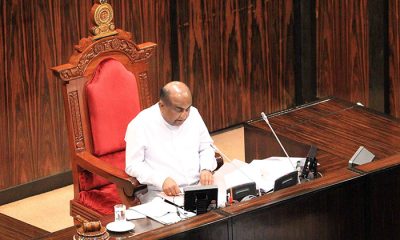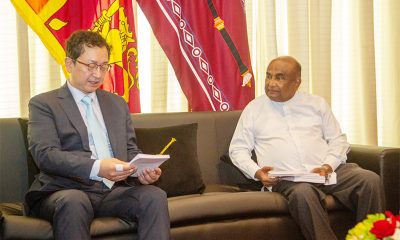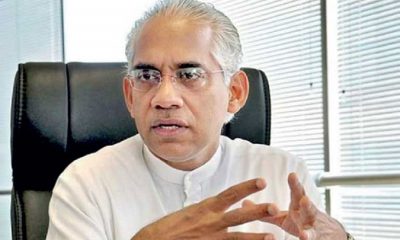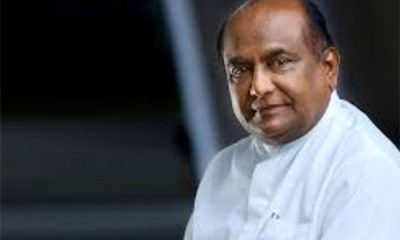News
Two private member’s Bills presented to amend two tax laws to bring about parliament oversight
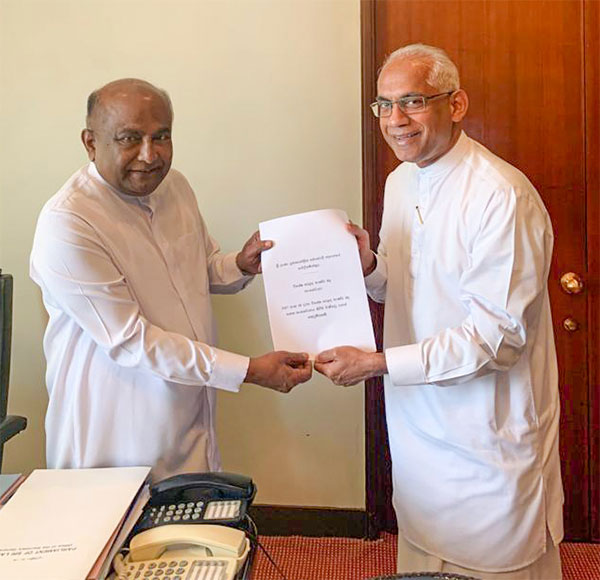
SJB MP Eran Wickramaratne yesterday (08) tabled two private member’s Bills to amend both the Value Added Tax Act No. 14 of 2002 (as amended) and the Special Commodity Levy Act No. 48 of 2007.
The following is the text of a statement issued by the former State Finance Minister: “These two amendments seek to facilitate parliamentary control over public finance as constitutionality required, and prevent the executive (Minister) from abusing statutory powers, including by (corruptly) granting benefits to a chosen few.
As the people of Sri Lanka are calling for more accountability and transparency with regard to public finances in the country, I have brought these two amendments to ensure parliamentary control on any changes to Value Added Tax (VAT) and to the Special Commodities Levy.
Sri Lanka’s parliament is constitutionally supposed to have full control over public finances (article 148).
However, there is currently tax legislation that actually violates this imperative provision, and instead gives discretion to the minister on: (i) tax exemptions, (ii) tax base, and (iii) tax rate. This type of discretion is seen in two key tax acts, the Value Added Tax Act No. 14 of 2002 (as amended) and the Special Commodity Levy Act No. 48 of 2007.
In both pieces of legislation, the minister has complete discretion to change taxation and simply announce it through a gazette notification. The decision to change taxation comes into effect immediately on the Minister’s signature and will only later be approved by Parliament. Even if it is not approved, whatever actions by the minister (e.g. reducing VAT or SCL) through the Order cannot be reversed by parliament but only discontinued. This leaves an extraordinary amount of power in the minister’s hands and leaves room for the tax system to be abused in favour of vested interests and potential corrupt activities.
The well-known sugar scam from 2020 is an example of the impacts of leaving the discretionary power with the minister. Prior to October 2020, sugar taxes were LKR 50 per kilo of sugar, and were drastically reduced to 25cents per kg. This is a reduction of 99.5% taxes on imported sugar. The gap between the cost to the importer and the market price has increased substantially after the tax reduction. According to the National Audit Office of Sri Lanka, between October 2020 and February 2021 we have cumulatively lost LKR 16 billion in potential tax revenue. PublicFinance.lk has noted that the benefit of the tax reduction was not passed on to the consumer and importantly that Sri Lanka has lost approximately LKR 59 billion in cumulative revenue from October 2020 until December 2022 by cutting the SCL on sugar imports.
The discretionary power of the minister to make ad hoc changes to taxation can also have serious impact on the country’s economy. At a time when the country is facing a severe economic crisis, and when there are calls from the people to have more transparency and accountability of our public finances, it is imperative that parliament retains full control over public finance as mandated by Article 148 of the Constitution.
Therefore, I have submitted these two amendments to amend the VAT and SCL to promote fiscal accountability and ensure that decisions on taxation are transparent and are discussed in the public domain.
The government in 2022 tried to bring a new tax called the Special Goods and Services Tax (GST) Bill, which gave the minister similar powers to that which presently exists in the VAT and SCL framework. However, the Supreme Court in very strong terms held the Bill to be unconstitutional and even violated the sovereignty of the People. The Court held: Thus, by empowering the Minister in the manner provided in clauses 2 and 3, the Parliament distinctively and manifestly loses control over public finance and unconstitutionally alienates such power to the Minister. In the circumstances, this Court holds that clauses 2, 3 and 4 individually and collectively amount to an infringement of Article 148 of the Constitution read with Article 76, and by virtue of such infringement violates Article 4 read with Article 3 of the Constitution.
The proposed amendments will bring the relevant portion of the VAT and SCL laws in conformity with the constitutional framework, as recognised by the Supreme Court in the Special GST Bill Determination.”
News
US sports envoys to Lanka to champion youth development

The U.S. Embassy in Colombo welcomed the U.S. Sports Envoys to Sri Lanka, former National Basketball Association (NBA) and Women’s National Basketball Association (WNBA) players Stephen Howard and Astou Ndiaye, from June 8 through 14.
The Public Diplomacy section of the U.S. Embassy said that it would launch a weeklong basketball program intended to harness the unifying power of sports, made possible through collaboration with Foundation of Goodness and IImpact Hoop Lab.
While in Sri Lanka, Howard and Ndiaye, both retired professional basketball players, will conduct a weeklong program, Hoops for Hope: Bridging Borders through Basketball. The Sports Envoys will lead basketball clinics and exhibition matches and engage in leadership sessions in Colombo and Southern Province for youth aged 14-18 from Northern, Uva, Eastern and Western Provinces, offering skills and leadership training both on and off the court. The U.S. Envoys will also share their expertise with the Sri Lanka Basketball Federation, national coaches, and players, furthering the development of basketball in the country. Beyond the clinics, they will collaborate with Sri Lankan schoolchildren to take part in a community service project in the Colombo area.
“We are so proud to welcome Stephen and Astou as our Sports Envoys to Sri Lanka, to build on the strong people-to-people connections between the United States and Sri Lanka,” said U.S. Ambassador Julie Chung. “The lessons that will be shared by our Sports Envoys – communication, teamwork, resilience, inclusion, and conflict resolution – are essential for leadership development, community building, equality, and peace. The U.S. Sports Envoy program is a testament to our belief that sports can be a powerful tool in promoting peace and unity.”
News
Rahuman questions sudden cancellation of leave of CEB employees

SJB Colombo District MP Mujibur Rahuman in parliament demanded to know from the government the reasons for CEB suspending the leave of all its employees until further notice from Thursday.
MP Rahuman said that the CEB has got an acting General Manager anew and the latter yesterday morning issued a circular suspending leave of all CEB employees with immediate effect until further notice.
“We demand that Minister Kanchana Wijesekera should explain this to the House. This circular was issued while this debate on the new Electricity Amendment Bill was pending. There are many who oppose this Bill. The Minister must tell parliament the reason for the urge to cancel the leave of CEB employees,” the MP said.However, Speaker Mahinda Yapa Abeywardena prevented Minister Wijesekera responding to the query and said that the matter raised by MP Rahuman was not relevant.
News
CIPM successfully concludes 8th Annual Symposium

The Chartered Institute of Personnel Management (CIPM) successfully concluded the 8th Annual CIPM Symposium, which took place on 31st May 2024. Themed “Nurturing the Human Element—Redefining HRM in a Rapidly Changing World,” the symposium underscored the pivotal role of human resource management (HRM) in today’s dynamic global landscape. Since its inception in 1959, CIPM has been dedicated to advancing the HR profession through education, professional development, and advocacy, solidifying its position as Sri Lanka’s leading professional body for HRM.
Ken Vijayakumar, the President of the CIPM, graced the occasion as the chief guest. The symposium commenced with the welcome address by the Chairperson, Prof. Arosha Adikaram, followed by the Web Launch of the Symposium Proceedings and Abstract Book by the CIPM President. The event featured distinguished addresses, including a speech by Chief Guest Ken Vijayakumar, President of CIPM, and an address by Guest of Honor Shakthi Ranatunga, Chief Operating Officer of MAS Holdings Pvt. Ltd., Sri Lanka.
The symposium also featured an inspiring keynote address by Prof. Mario Fernando, Professor of Management and Director of the Centre for Cross Cultural Management (CCCM) at the University of Wollongong, Australia.
Vote of Thanks of the inauguration session was delivered by Dr. Dillanjani Weeratunga, Symposium Co-chair.
The symposium served as a comprehensive platform for researchers to present their findings across a wide range of critical topics in HRM. These included Cultural Diversity and Inclusion, Talent Development and Retention, Ethical Leadership and Corporate Social Responsibility, Adapting to Technological Advancements, Mental Health and Well-being at Work, Global Workforce Challenges, Employee Empowerment, and Reskilling and Upskilling.
The plenary session was led by Prof. Wasantha Rajapakse. Certificates were awarded to the best paper presenters during the valedictory session, followed by a vote of thanks delivered by Kamani Perera, Manager of Research and Development.
The annual symposium of CIPM was a truly inclusive event, attracting a diverse audience that spanned undergraduates, graduates, working professionals, research scholars and lecturers. This widespread interest highlights the symposium’s significance in the field of HRM, offering a unique opportunity for everyone to network and learn from scholarly brains.The CIPM International Research Symposium was sponsored by Hambantota International Port, Sri Lanka Institute of Information Technology (SLIIT), E B Creasy & Co. PLC, and Print Xcel Company.


